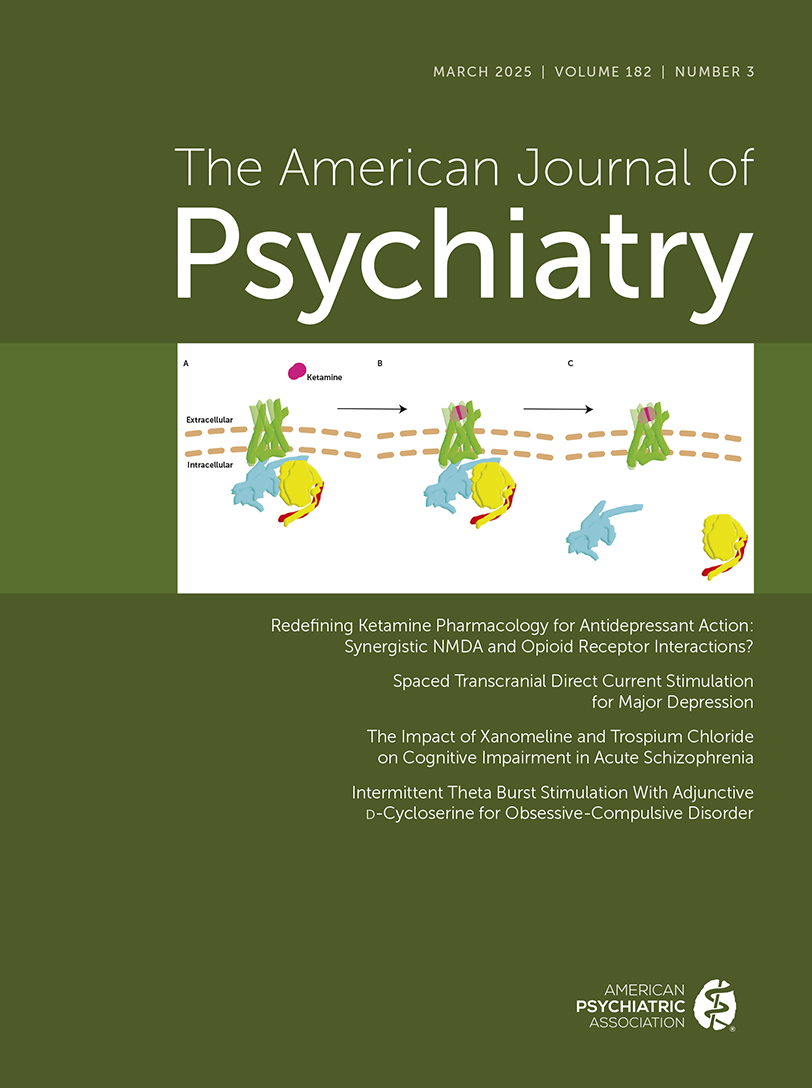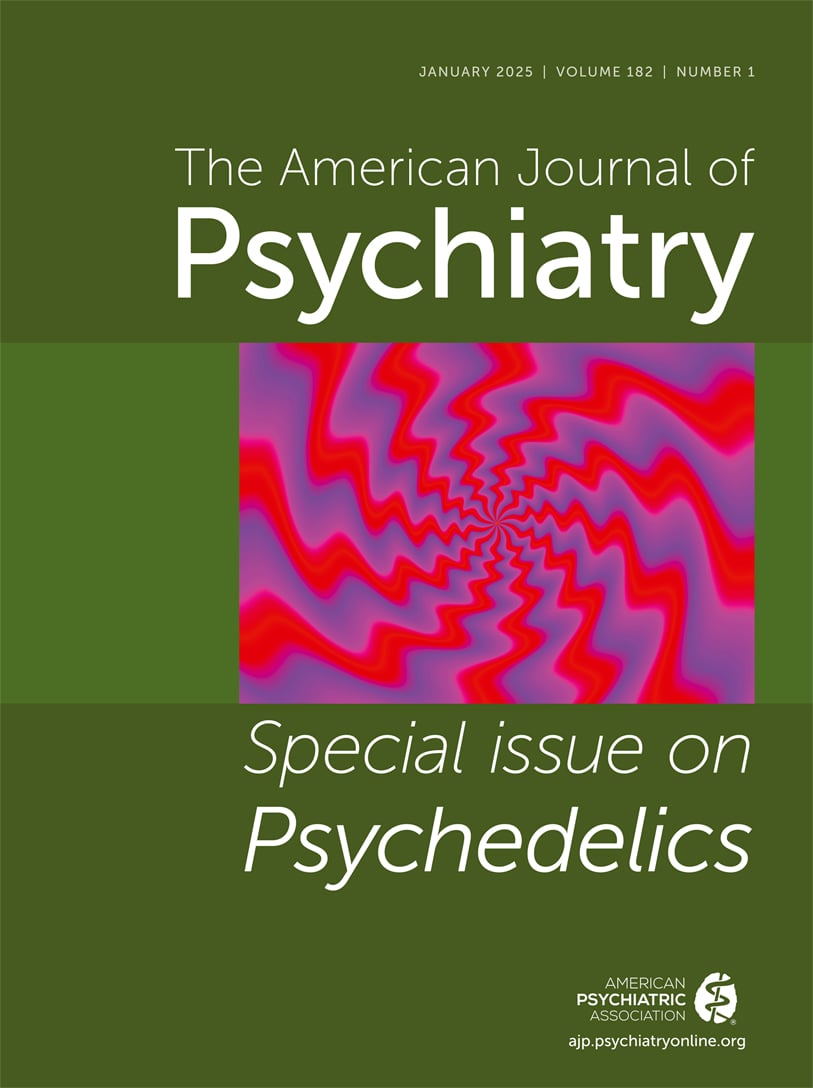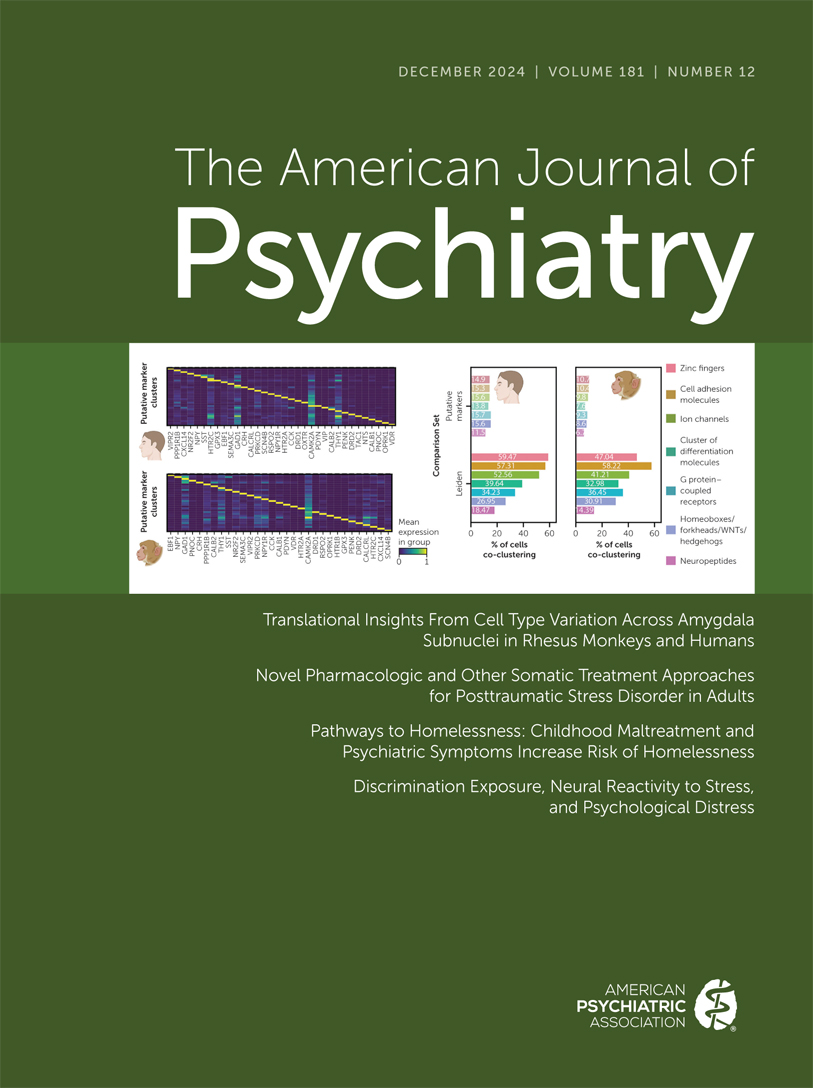American Journal of Psychiatry
- Volume 162
- Number 1
- January 2005
In This Issue
Editorial
Reviews and Overviews
Publication date: 01 January 2005
Pages3–11Psychiatric genetics, which is growing in size and influence within psychiatry, employs four major research paradigms: 1) basic genetic epidemiology, 2) advanced genetic epidemiology, 3) gene finding methods, and 4) molecular genetics. Paradigms 1 and 2 ...
https://doi.org/10.1176/appi.ajp.162.1.3Publication date: 01 January 2005
Pages12–24OBJECTIVE: The authors synthesize findings of previous studies implicating migration as a risk factor for the development of schizophrenia and provide a quantitative index of the associated effect size. METHOD: MEDLINE was searched for population-based ...
https://doi.org/10.1176/appi.ajp.162.1.12Images in Neuroscience
Introspections
Clinical Case Conference
Images in Psychiatry
Article
Publication date: 01 January 2005
Pages35–42OBJECTIVE: The authors previously reported two families (pedigrees 324 and 5501) in which Darier’s disease—a rare, autosomal dominant skin disease—and bipolar disorder cosegregate. In each of these families there is complete cosegregation of mood disorder ...
https://doi.org/10.1176/appi.ajp.162.1.35Publication date: 01 January 2005
Pages43–49OBJECTIVE: People with schizophrenia, schizoaffective disorder, and bipolar illness share clinical symptoms, biological findings, and genetic susceptibility. Diminished suppression of the P50 auditory evoked potential is a phenotype used in studies of ...
https://doi.org/10.1176/appi.ajp.162.1.43Publication date: 01 January 2005
Pages50–57OBJECTIVE: The authors investigated sleep-related functioning in euthymic patients with bipolar disorder. METHOD: Euthymic patients with bipolar disorder (N=20), patients with insomnia (N=20), and subjects with good sleep (N=20) were compared on data from ...
https://doi.org/10.1176/appi.ajp.162.1.50Publication date: 01 January 2005
Pages58–64OBJECTIVE: The purpose of this study was to determine whether adjunctive use of a psychostimulant (mixed amphetamine salts) was safe and efficacious for treatment of symptoms of attention deficit hyperactivity disorder (ADHD) in pediatric outpatients with ...
https://doi.org/10.1176/appi.ajp.162.1.58Publication date: 01 January 2005
Pages65–70OBJECTIVE: The purpose of this study was to investigate abnormalities in the surface complexity of the prefrontal cortex and in the hemispheric asymmetry of cortical complexity in first-episode patients with schizophrenia. METHOD: An estimate of the ...
https://doi.org/10.1176/appi.ajp.162.1.65Publication date: 01 January 2005
Pages71–78OBJECTIVE: While cognitive deficits are frequently reported in psychotic disorders, it is unclear whether these impairments predate the onset of illness and to what extent they are predictive of later transition to psychosis. METHOD: The authors studied ...
https://doi.org/10.1176/appi.ajp.162.1.71Publication date: 01 January 2005
Pages79–91OBJECTIVE: This study ascertained the incidence of complications during pregnancy, labor, and delivery and the neonatal characteristics of infants born to women with schizophrenia, bipolar disorder, or major depression in a population-based cohort. METHOD:...
https://doi.org/10.1176/appi.ajp.162.1.79Publication date: 01 January 2005
Pages92–101OBJECTIVE: Blunted affect is a major symptom in schizophrenia, and affective deficits clinically encompass deficits in expressiveness. Emotion research and ethological studies have shown that patients with schizophrenia are impaired in various modalities ...
https://doi.org/10.1176/appi.ajp.162.1.92Publication date: 01 January 2005
Pages102–109OBJECTIVE: The authors compared the patterns and specificity of premorbid personality dimensions in first-episode schizophrenia patients with those in patients with first-episode nonschizophrenia psychoses and healthy comparison subjects. METHOD: A series ...
https://doi.org/10.1176/appi.ajp.162.1.102Stability of Cognitive Performance in Older Patients With Schizophrenia: An 8-Week Test-Retest Study
Publication date: 01 January 2005
Pages110–117OBJECTIVE: It is important to understand the stability of cognitive performance in schizophrenia in order to understand 1) the potential improvements in performance associated with the beneficial effects of cognitive-enhancing medications and 2) the ...
https://doi.org/10.1176/appi.ajp.162.1.110Publication date: 01 January 2005
Pages118–123OBJECTIVE: Weight gain is a commonly observed adverse effect of atypical antipsychotic medications, but associated changes in energy balance and body composition are not well defined. The authors report here the effect of olanzapine on body weight, body ...
https://doi.org/10.1176/appi.ajp.162.1.118Publication date: 01 January 2005
Pages124–129OBJECTIVE: Olanzapine has been hypothesized to have superior efficacy in patients with treatment-resistant schizophrenia. The authors examined the comparative efficacy and safety of olanzapine and haloperidol in outpatients with partially responsive ...
https://doi.org/10.1176/appi.ajp.162.1.124Publication date: 01 January 2005
Pages130–136OBJECTIVE: The authors evaluated the efficacy and safety of augmenting clozapine with risperidone in patients with treatment-resistant schizophrenia. METHOD: In a randomized, double-blind, placebo-controlled 12-week trial, 40 patients unresponsive or ...
https://doi.org/10.1176/appi.ajp.162.1.130Publication date: 01 January 2005
Pages137–145OBJECTIVE: Selective serotonin reuptake inhibitors may be effective for some patients with pathological gambling, but those with comorbid conditions, such as bipolar spectrum disorders, may relapse during treatment. To the authors’ knowledge, this is the ...
https://doi.org/10.1176/appi.ajp.162.1.137Publication date: 01 January 2005
Pages146–150OBJECTIVE: Anxiety disorders are highly prevalent in elderly persons. However, to date, the efficacy of selective serotonin reuptake inhibitors (SSRIs) for the treatment of anxiety disorders in this age group has not been established. METHOD: Thirty-four ...
https://doi.org/10.1176/appi.ajp.162.1.146Publication date: 01 January 2005
Pages151–161OBJECTIVE: The purpose of the study was to test the relative and combined efficacy of clomipramine and exposure and ritual prevention in the treatment of obsessive-compulsive disorder (OCD) in adults. Serotonin reuptake inhibitors (SRIs) and cognitive ...
https://doi.org/10.1176/appi.ajp.162.1.151Publication date: 01 January 2005
Pages162–167OBJECTIVE: Osteoporosis is regularly mentioned as a possible consequence of treatment with prolactin-increasing antipsychotic medications, but little is known about the prevalence and the degree of loss of bone mineral density in patients suffering from ...
https://doi.org/10.1176/appi.ajp.162.1.162Publication date: 01 January 2005
Pages168–174OBJECTIVE: The pathogenesis of bone loss in major depressive disorder is a matter of debate. Studies of bone loss in nonpsychiatric medical disorders have found an association between the activation of osteoclastic cells and an imbalance of pro- and ...
https://doi.org/10.1176/appi.ajp.162.1.168Brief Report
Publication date: 01 January 2005
Pages175–177OBJECTIVE: Depression has been associated with increases in circulating cytokines in younger adults, and there is evidence for prefrontal inflammation in late-life depression. The authors tested the hypothesis that levels of cytokine interleukin-1β (IL-1β)...
https://doi.org/10.1176/appi.ajp.162.1.175Publication date: 01 January 2005
Pages178–180OBJECTIVE: The impact of depression and perceived loneliness in the oldest old is largely unknown. The authors studied the relationship between the presence of depressive symptoms and all-cause mortality in old age, especially the potential distorting ...
https://doi.org/10.1176/appi.ajp.162.1.178Publication date: 01 January 2005
Pages181–183OBJECTIVE: This article describes pilot testing of interpersonal psychotherapy adapted for posttraumatic stress disorder (PTSD). Unlike most psychotherapies for PTSD, interpersonal psychotherapy is not exposure-based, focusing instead on interpersonal ...
https://doi.org/10.1176/appi.ajp.162.1.181Publication date: 01 January 2005
Pages184–186OBJECTIVE: This pilot study tests the usefulness of the Treatment Initiation Program (TIP) to improve depression in older adults. The TIP is an individualized, early intervention to address older adults’ attitudes (e.g., perceived need for care and stigma)...
https://doi.org/10.1176/appi.ajp.162.1.184Publication date: 01 January 2005
Pages186–188OBJECTIVE: This study evaluated a brief educational video designed to enhance the informed consent process for people with serious mental and medical illnesses who are considering participating in treatment research. METHOD: Individuals with schizophrenia ...
https://doi.org/10.1176/appi.ajp.162.1.186Publication date: 01 January 2005
Pages189–191OBJECTIVE: As part of a synthesis of evidence regarding the efficacy and safety of ephedra, the authors describe data on psychiatric adverse events from reports submitted to the Food and Drug Administration (FDA). METHOD: The authors reviewed all 1,820 ...
https://doi.org/10.1176/appi.ajp.162.1.189Letter to the Editor
Book Forum: Childhood Disorders
Book Forum: Thinking About the Future
Book Forum: Cognitive Impairment
Book Forum: Anxiety Disorders
Book Forum: Compulsive Disorders and Eating Disorders
Book Forum: History of Psychoanalysis and Psychiatry
Disclosure
Past Issues
View Issues Archive
Vol. 182 | No. 3

Vol. 182 | No. 2

Vol. 182 | No. 1
